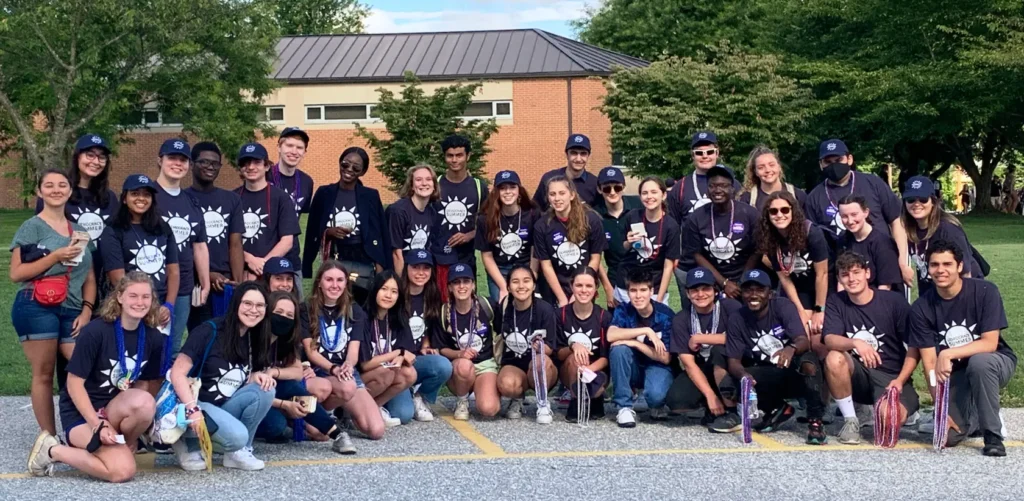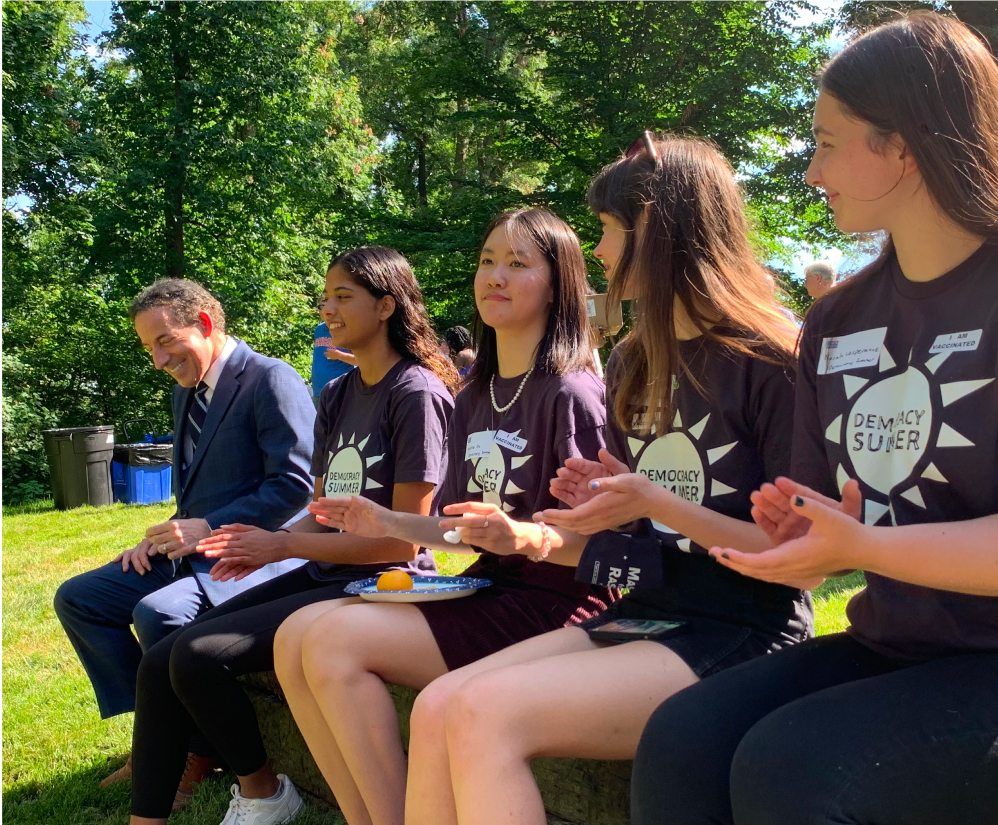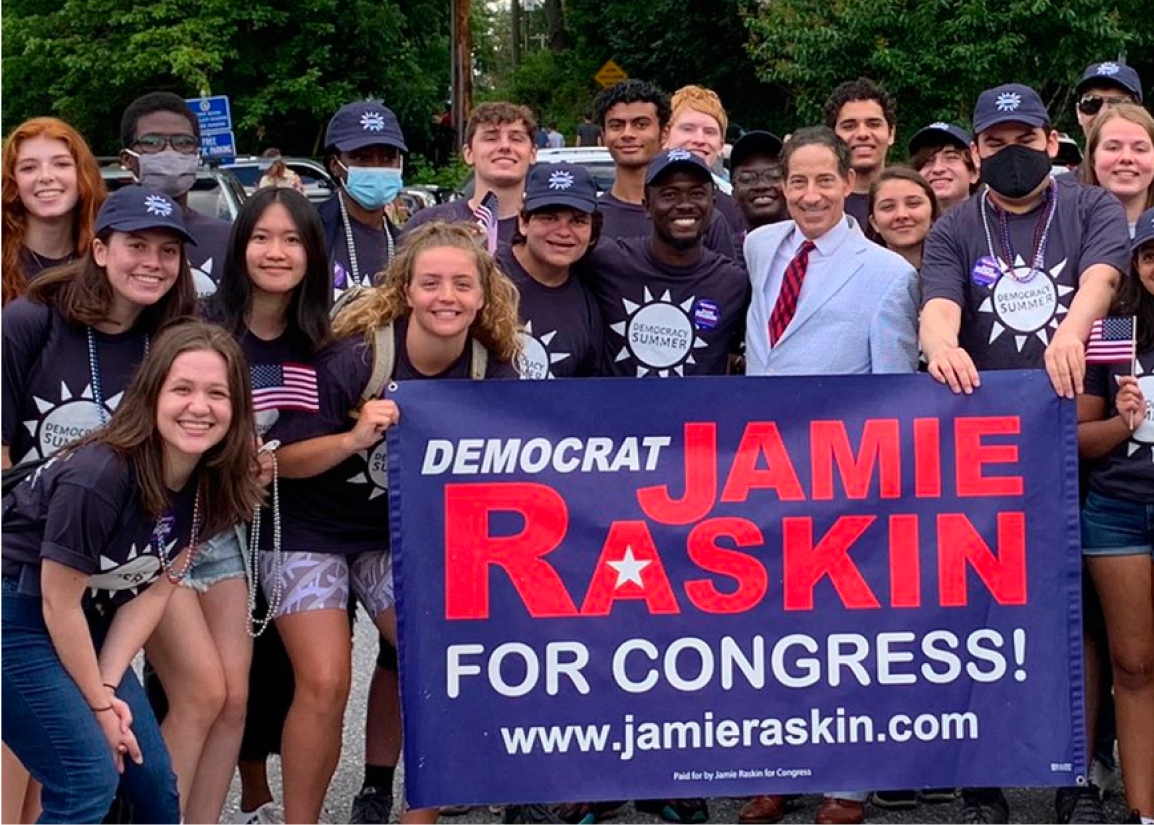Democracy Summer
What is Democracy Summer?
The Democracy Summer project trains and deploys the next generation of Democratic organizers and leaders to win elections all over America.
Founded by Congressman Jamie Raskin, backed by the Democratic Congressional Campaign Committee, and buoyed by thousands of supportive alumni across the country, Democracy Summer engages high school and college-aged young people in state-of-the-art tactics in voter registration, canvassing and digital political organizing. Moreover, through on-line seminars with leading historians, law professors, political organizers and union and elected leaders, it provides an intensive education in the historical struggle for democratic freedom and essential lessons for effective political leadership today.
How did Democracy Summer begin?
Democracy Summer was born in 2006 during Jamie’s first-ever campaign for Maryland State Senate when he was running against a 32-year incumbent who was president pro tem of the Maryland Senate and chair of the Montgomery County Senate delegation.
Jamie wanted to get his three kids and a dozen nieces and nephews involved in his campaign. He knew that if he was going to compete against a powerful incumbent backed by machine politics and big money, he needed to mobilize young people and then get them to convince their families and friends to join in.
Promising young people not just a lot of hard work but a “school for democracy,” Jamie launched the Democracy Summer program which included in-depth discussion of the major issues Jamie was running on, including abolition of the death penalty, marriage equality, restoration of voting rights to former prisoners, campaign finance reform and replacement of the electoral college with a national popular vote for president.

Democracy Summer Fellows received a dazzling education from some of the greatest political thinkers, leaders, activists, and campaign managers in America, including the late Bob Moses, the organizer of Freedom Summer and the Student Nonviolent Coordinating Committee. The Fellows went to work in neighborhoods, where they put their skills to practice—knocking on doors, organizing supporters, and spreading the word through yard signs, bumper stickers and local barbecues,
That summer, Democracy Summer Fellows and their families and friends knocked on more than 35,000 doors, and Jamie knocked on 17,000 personally, deriving a whole new model for how to run campaigns.
When Jamie first launched his campaign, a pundit told a local newspaper that his chances of victory were considered “impossible.” But nine months later, after building a grassroots campaign that educated and mobilized thousands of people, Jamie won the race with 67 percent of the vote. On Election Night, the Washington Post quoted a pundit who said that his victory was “inevitable.”
He went from “impossible” to “inevitable” in nine months.
But Jamie teaches the young people in Democracy Summer that, in politics, “nothing is impossible and nothing is inevitable.” Change, he says, is only possible through the democratic arts of educating, organizing and mobilizing people for change.
Democracy Summer dominated Jamie’s subsequent State Senate campaigns and became the center of gravity for his first campaign for Congress in 2016. In that year, he was in a nine-way primary fight against a billionaire CEO, a local television celebrity, and six other well-qualified candidates. Jamie’s campaign was outspent by a margin of more than 9-1 and was drowned out on TV, but Democracy Summer roared ahead like a freight train. Jamie prevailed in a race that was then the most expensive House primary election in American history.
When did Democracy Summer expand nationwide?
Democracy Summer expanded nationally for the first time in 2021 in an historic partnership with the DCCC and multiple campaigns of Democratic Members. Democracy Summer expanded nationally for the first time in 2021 in an historic partnership with the DCCC and campaigns of Democratic Members—and in 2024, more than 110 House Democratic campaigns across America joined Democracy Summer to recruit a new generation of political activists and leaders.
Our virtual curriculum has featured lectures on the struggle for democracy and voting rights from academic luminaries like Harvard Professor Alex Keyssar, who speaks on his books The Right to Vote: The History of a Contested Right and Why Do We Still Have the Electoral College?; expert voting rights lawyers like Marc Elias, who speaks about how to understand and combat rampant voter suppression; elected officials like former House Speaker Nancy Pelosi and the late John Lewis, a stalwart supporter of Democracy Summer until his death; and labor leaders like the Executive Director of the Labor Heritage Foundation, Elise Bryant, who gives our Fellows insight into the major contributions of the labor movement to political, economic and cultural democracy.
In prior years, the program has also featured powerful supplementary teachings on the climate crisis, gun violence prevention and the power of the NRA, the assault on reproductive freedom, wealth inequality and tax policy, immigration and refugee policy, the Electoral College and the National Popular Vote campaign, redistricting and gerrymandering, the domestic budget and the military budget, U.S. foreign policy and Congressional power to declare war, education policy, civil rights and civil liberties, and the continuing spread of voter suppression tactics in GOP-controlled state legislatures. Other popular speakers have included Rev. William J. Barber II, Prof. Laurence Tribe, Bob Bauer, Senator Elizabeth Warren, Rep. Alexandria Ocasio-Cortez, Greg Moore, Rob Richie, Cindy Terrell and many more.
From our partners
How can I get involved?
We have planned an exciting program for Democracy Summer 2025!
For six weeks during the summer, Fellows will commit to participating in at least 4-5 hours a week of virtual seminars, discussions and workshops, and an additional 10-15 hours a week of in-person organizing with their local Democratic Congressperson or candidate. Most Fellows end up choosing to spend a lot more time than this in campaign activities but these are the minimal expectations. Applicants will be selected both by the national Democracy Summer team and then by your local Democratic Congressperson or Congressional nominee.
Click below to apply for our 2025 program! The priority application deadline is Friday, April 18th.
Make sure also to stay up to date with Democracy Summer by following us @NatlDemSummer on Twitter and Instagram!
For questions about the program, please contact our National Director, Madeline Kracov at Madeline@JamieRaskin.com


